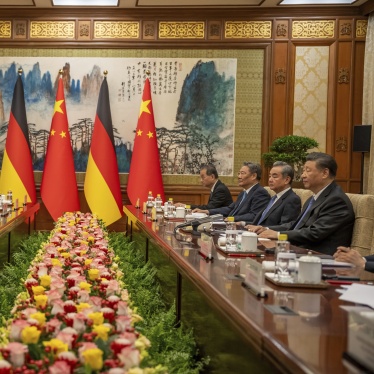(New York) – China should immediately release Li Guozhu, a farmers' rights advocate who was detained in early November after he investigated deadly ethnic clashes in Henan province, Human Rights Watch said today. Farmers’ rights advocates are increasingly visible in assisting farmers in petitioning the government to redress grievances.
Witnesses told Li’s family of his arrest, but Li’s family has received no formal notification of his status or whereabouts. Li’s detention appears to be part of a widening crackdown on both intellectuals and rights advocates in China.
“This detention shows China’s determination to keep a grip on the flow of information,” said Brad Adams, Asia director of Human Rights Watch. “It also shows the clear risks for those left out of China’s macroeconomic boom who dare to seek justice for themselves and their communities.”
Human Rights Watch said this week that authorities also detained and released Chen Min, chief editorial writer at China Reform magazine. Chinese authorities have detained and questioned at least four other prominent intellectuals in the past month, all of whom have been released with warnings.
At the same time, the government appears to be expanding its crackdown on those defending the interest of farmers. Police recently detained another farmer's advocate, Li Boguang, and in September detained New York Times researcher and journalist Zhao Yan, who had previously worked with farmers on their appeals to local and central authorities.
Li Guozhu, 48, appears to have been detained this time because of his research into the violence in Henan. In early November, Li spent two days in Zhongmou county in Henan province, an area placed under martial law after violent clashes between Han Chinese and Hui Muslim communities. After he investigated the conflicts and offered assistance to victims, Li sent copies of his interviews with residents along with photographs of restaurants damaged in the riots to foreign journalists.
On November 12, after Li returned to Beijing, eight police officers and the local village chief went to the office of Sanchun Dadi (Spring on the Land), a grass-roots advocacy group on the outskirts of Beijing where Li works as a volunteer, to question him about his Henan trip. The group assists farmers in petitioning for government redress in cases of corrupt officials, property seizures, and other rural abuses. He was then detained. Officials have made no statements on his whereabouts, condition or the charges against him.
Li, a former officer in a Heilongjiang prison management bureau, is married and has a three-year old son. His wife is partially disabled. On December 2, Li’s wife, who had not been able to obtain information about her husband’s location after his detention, traveled to Beijing from their home to seek information. Police officers from Heilongjiang detained her in Beijing and immediately brought her home.
“The lack of access to justice in China is fuelling more clashes between petitioners and the police,” Adams said. “Jailing respected advocates like Li Guozhu will only make matters worse.”
In 2004, Li became increasingly visible in the growing numbers of street protests by petitioners in Beijing. During years in Beijing spent on his own petition on a Heilongjiang case, Li became active in assisting other petitioners with their cases, offering advice and legal aid. He often spoke to domestic and international media about their problems with access to justice. In response, police from Heilongjiang traveled to Beijing and detained and released him in August and September without formal charges.
“China needs respected community activists to hold officials accountable in a period when they admit that many officials are corrupt and social stability is fragile,” said Adams. “As an impoverished petitioner, Li may live worlds away from the writers and thinkers who are also being jailed, but like them his only crime is to have exercised his right to free speech.”
Human Rights Watch said that thousands of Chinese travel to provincial capitals and Beijing to petition the government directly for redress in cases of police abuse, local corruption, forced relocation and other problems. Local and national government offices accept petitions from individuals and groups. The petitioning system has long provided an outlet for rural grievances. The past year has seen a steady rise in the numbers of rural petitioners traveling to Beijing, an increase in public street demonstrations by petitioners, and escalating clashes between petitioners and Beijing police. The rising conflicts have resulted in growing numbers of detentions and injuries.
“China's president and premier have publicly endorsed farmers’ rights, but recent arrests call these statements into question,” said Adams.






